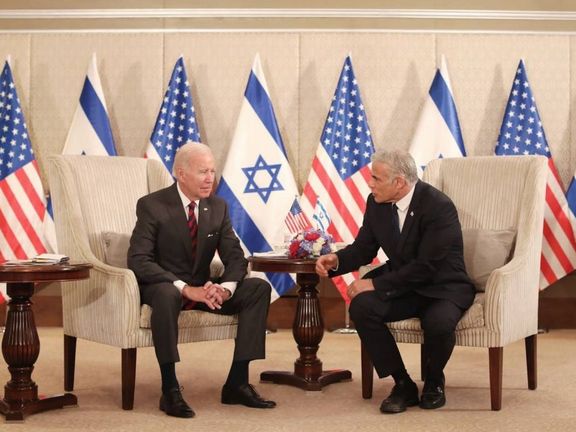Israeli Leader Tries To Claim Credit For Delay In Iran Nuclear Deal

Israel’s Prime Minister Yair Lapid headed to Berlin Sunday claiming to have fruitfully shaped Europe’s “strong position” over Iran, as he gears up for elections.

Israel’s Prime Minister Yair Lapid headed to Berlin Sunday claiming to have fruitfully shaped Europe’s “strong position” over Iran, as he gears up for elections.
Lapid has argued that his tactful approach to France, Germany, the United Kingdom, and the Biden administration has been more productive than the assertive stance of his rival Benjamin Netanyahu, as the two men lead their respective political blocs towards Israel’s November 1 parliamentary election.
“Yesterday the E3 countries announced that a nuclear agreement with Iran will not be signed in the near future, that the IAEA’s open files regarding Iran are not about to be closed,” Lapid said Sunday. “Israel is conducting a successful diplomatic campaign to stop the nuclear agreement and prevent the lifting of sanctions on Iran.”
However, what pushed the Europeans to say that there are “no active negotiations” was Iran’s latest response to a European Union draft agreement submitted to Tehran and Washington on August 8. Iran’s response was called “non-constructive” by the Biden administration and seen by the E3 as a sign of lack of willingness to make a deal by Tehran.
If Iran’s response was different after 17 months of talks, the Biden administration had already agreed to the EU draft and the optimism prevailing in August would have been justified.
Iran insists that the International Atomic Energy Agency (IAEA) drop an enquiry into uranium traces found in sites linked to Tehran’s nuclear work before 2003. It also demands various sorts of guarantees from the US.

Time for ‘new agreement’
A “senior Israeli official” told journalists Sunday that the time had come to look for a “new agreement,” leading some Israeli media to proclaim the JCPOA dead. Unless the IAEA, Iran and the US together with the E3 change their minds, “there won't be any choice” but to abandon the 2015 deal, the Israeli official reportedly said.
Lapid said the aim of his trip to Germany was to coordinate “positions on the nuclear issue” and that he would be “finalizing the details of the strategic, economic, and security cooperation document we are going to sign.”
Lapid also stressed Israel was “working to prevent Iran from establishing terrorist bases throughout the Middle East and especially in Syria.” Israel regards Lebanon’s Hezbollah, a close Iranian ally, as well as most Palestinian groups as ‘terrorist.’ Lapid said there was a “growing terror threat in the West Bank,” according to the Jerusalem Post.
Consulting partners
The E3, apparently short of declaring the JCPOA talks dead as Lapid suggested, said it would “consult, alongside international partners” on how best to proceed, both over the continued expansion in Iran’s nuclear program and its failure to satisfy the IAEA over the uranium traces.
In Iran, some argue Europe’s attitude towards the talks may change as winter brings energy shortages due to sanctions on Russian energy exports and European leaders eye Iran’s 90 million barrels of oil in storage, which would be released with US sanctions eased should the JCPOA be restored.
Ali Akbar Salehi, who was head of the Atomic Energy Agency of Iran (AEOI) when the JCPOA was signed in 2015, defended the agreement this week against critics by arguing it had not fundamentally stymied Iran’s technological progress. Hence, Salehi argued, the AEOI had been quickly able to expand the program once parliament, in the wake of the November 2020 had passed legislation requiring a higher level of uranium enrichment and employing more advanced centrifuges.